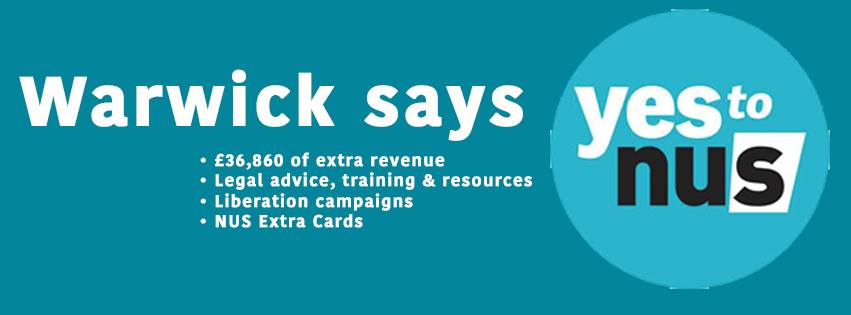NUS Costs-Benefits report published
The SU has just released a report on how much money is involved in its affiliation with the NUS.
This comes less than a day before the closing of the voting on whether or not Warwick should continue its affiliation with the NUS.
The release of the report is also under the Motion 054 which sets out to increase the accountability of the SU to its members.
Many of the statistics published were very different to what was being advertised earlier in the week.
In the academic year 2014 to 2015, a total of 3779 NUS Extra cards were sold to Warwick students, reeling in almost £35,000.
This leads to a profit of £87,736.30.
It has also been revealed that being part of the NUS has helped Warwick SU with its licensed trading through the NUS Standard Ltd (NUSSL), where the benefit was over £100,000.
The net benefit for the last academic year was £139,128. Overall, Warwick SU has to pay £51,391.70 for membership to the NUS.
This leads to a profit of £87,736.30.
Isaac Leigh, current President of the SU and in support of continued membership in the NUS, has stated: “Money is only one factor in this campaign, but the revised figure of £87,000 clearly reinforces that leaving the NUS would have a massive financial impact on Warwick SU. It’s frustrating for both sides not to have had the full picture on this aspect for the last three days.”
The revised figure is more than double of what “Warwick says Yes to NUS” had been advertising.
On their Facebook page, they have admitted that they have “essentially been significantly under-estimating the financial benefits of staying in the NUS for the past three days because of this error.”
It’s frustrating for both sides not to have had the full picture on this aspect for the last three days.
Isaac Leigh, SU President
The “NUS Exit Warwick” group has previously released a breakdown of the statistics, stating that, “ALL of the ‘savings’ made through NUSSL are calculated by comparing it to just one other trade consortium, the TUCO University Caterers Organisation.”
After being informed of the updated statistics, they stated, “The figures published continue resolutely to ignore possible cost savings. Other costs, whether direct, such as travel and subsistence, or indirect, from engagement with the NUS have been totally ignored.
“This is to be expected, since they undermine the headline net benefit they seek to highlight.”
This article will be updated as more information is released.

Comments